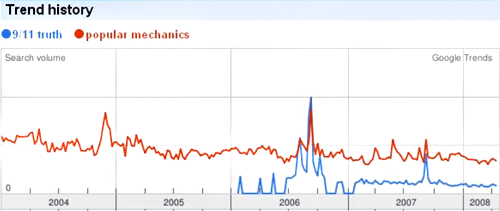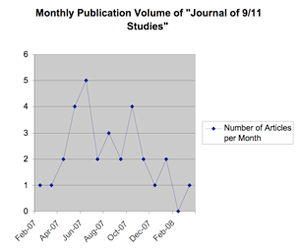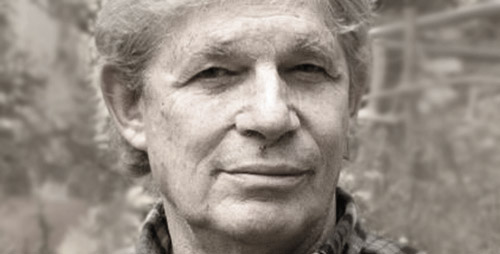MySpace is a registered trademark of MySpace, Inc.

The Skeptics Society is on MySpace!
The Skeptics Society now has a presence on MySpace®. Check out the official page (viewable by everyone, no account required). Becoming a friend or member of Skeptic magazine on sites like MySpace and Facebook enhances our visibility to the skeptic community. Stop in to show your support, leave an encouraging note, or upload some photos!
In this week’s eSkeptic, we present John Ray’s article celebrating the triumph of skepticism over 9/11 conspiracy theorists.
Ray is a sophomore decision science major at Carnegie-Mellon University who has been active in the 9/11 debate for three years. His work on the subject has been featured on Screw Loose Change and he runs a blog pertaining to the subject with three fellow skeptics. His work, including his critiques of the documentary Loose Change, has been used by other skeptics on several sites including the JREF forum and Facebook. Elsewhere, he has been a science journalist for a college newspaper and has been featured on prominent atheist blogs like Evolved Rational.

World Trade Center, South Tower (photo by Gulnara Samoilova / AP)
How Skeptics Confronted 9/11 Denialism
by John Ray
Skeptics today bemoan the overwhelming proportion of people who claim to believe in all manner of conspiracy theories from the JFK assassination to the origins of HIV-AIDS. For that reason, it may be worthwhile to take a moment to stop and celebrate one area in which skeptical advocacy has been overwhelming successful: the world of 9/11 conspiracies. Through the work of scholars like Michael Shermer and James Meigs, along with everyday skeptics on the grassroots level, critical inquiry has been overwhelmingly successful in calling these conspiracy theorists to task.
A tragedy on a scale at least comparable to Pearl Harbor or the Kennedy assassination was bound to inspire a conspiracy subculture, but the takeoff success of the viral Internet documentary Loose Change and the movement it created was unprecedented. Looking out on the world in 2005 when Change became one of the most-watched Internet videos of all time, with over ten million unique viewers1, it was hard to anticipate a future that was anything but bleak for those who felt it was their duty to defend history from such pseudohistorians.
Yet, in just under four years, the 9/11 “truth movement” has ground to a halt. Apart from the fundamental incoherence of their theories, the downfall of the 9/11 denier juggernaut was good old-fashioned skepticism at its finest, the kind that conjures visions of James Randi challenging psychics and faith healers on their home turfs and winning. Skeptics are better at their jobs than they think, and its important to give credit where credit is due.
Staking their fortunes almost solely on Internet-based content may have been the 9/11 deniers’ biggest mistake. What seems like a perfect place for pseudoscience — the Internet is un-edited, without fact-checkers or minimum publishing standards of any kind — also became a perfect place for a rapid-response system of blogs and forums to fight back. Drawing on the freely available technical information from the NIST, FEMA, and academic journals which most colleges let their students access for free, skeptical sites like ScrewLooseChange.blogspot.com and debunking911.com are able to defuse 9/11 denier claims as they arise.
The Internet forced many “ground-level” 9/11 deniers — those who spread the gospel on popular social networking sites like Facebook and in their own blogosphere — into a rhetorical corner.
Instantaneous information traps old, well-discussed claims into sheer redundancy. In three years of debating 9/11 deniers, I have encountered almost the exact same laundry list of claims on dozens of occasions. The same resources have been successful in debunking 9/11 myths since their inception, tipping the debate against them. The first Loose Change was a sweeping work that, by this author’s estimation2, implicated roughly 578,000 people in their version of 9/11; the “final edition,” though twice as long, has orders of magnitude less content and almost zero positive claims, drumming up a meager 8,200 suspects3. This is almost certainly a result of Internet-based skeptics bombarding Loose Change’s makers with the facts.
What should go down as a knockout blow to the 9/11 denier movement, what Michael Shermer called “just about one of the best things ever done in the history of skepticism,”4 is the now-famous Popular Mechanics article turned into a best-selling book that debunked many of the top points the conspiracy theorists relied on. Joining a chorus of mainstream publications including Skeptic and taking the central claims head on, the Popular Mechanics article became a cornerstone for the 9/11 denier movement’s undoing.

The spike in 2006, prompted by the live debate between the editors of Popular Mechanics and the producers of the documentary Loose Change, shows that not only was the skeptical perspective more well-accepted than the conspiracy perspective, it began to dictate the conversation. (Graph produced using Google Trends by the author.)
The Popular Mechanics article was published in its March 2005 issue and became an Internet hit after the live debate hosted by Democracy Now! between Popular Mechanics editors Jim Meigs and David Dunbar and Loose Change creators Dylan Avery and Jason Bermas. In the aftermath of that debate — if this is any indicator of which side presented the better case — that article became the most popularly searched item pertaining to 9/11 conspiracies and, from that point on, the skeptical perspective became the dominant voice pertaining to the movement. The conversation was brought to the mainstream, and the mainstream made its decision.
Today, the 9/11 conspiracy movement is a shell of what it once was. The website masquerading as an academic journal, Journal of 9/11 Studies, has dropped from a high of six or seven articles published per issue to one, and its February 2008 edition (it’s supposed to be updated monthly) was simply skipped over, evidently for lack of a single article. The introduction to the main hub of 9/11 denier activity, 911truth.org, welcomes its visitors with a plea that announces, “we’ve cut to the bare bones, but are still far short of our basic budget needs.” Prominent “truthers” like Mark Dice, Dylan Avery, Jimmy Walter (lambasted in Penn & Teller’s Showtime series Bullshit! episode on 9/11), and Kevin Ryan have dropped into obscurity. The well read author David Ray Griffin continues to lecture, but to shrunken audiences, and this year’s big 9/11 rally looks to be set in Ottawa, not New York City — evidently due to lack of interest.

The number of articles on the popular conspiracy site “Journal of 9/11 Studies” has rapidly dwindled since a peak last year. (Graph produced using Microsoft Excel by the author.)
It is rare when those of us in the skeptical community get to celebrate a concrete success in building public consensus on an issue of pseudoscience. In the combination of grassroots Internet support and mainstream media advocacy we have seen one such moment. It was once feared that the 9/11 conspiracies would be the next JFK conspiracies — silly yet pernicious, running unchecked until it was too late. The opposite has happened here. Because the skeptical community gave the public some well-needed straight talk on the issue, pulled no punches, and let no challenge go soundly unanswered, we have won in six years what could have become a half-century long, uphill battle as with JFK conspiracy theories. Here’s to winning once in awhile.
References
- Sales, N. “Click Here for Conspiracy.” Vanity Fair, August, 2006, www.vanityfair.com/ontheweb/features/2006/08/loosechange200608
- Ray, J. “Total Personnel Required for ‘Loose Change’ Version of 9/11: 578,212,” www.facebook.com/photo.php?pid=34802512&op=1&o=all&view=all&subj=2211830485&aid=-1&oid=2211830485&id=5523995 . Original content created by author of this article based on information presented in “Loose Change: Final Cut.”
- Ray, J. “8,157 High-Ranking American, British, and Pakistani Officials are Out to Get You!” http://conspiraciesrnotus.blogspot.com/2007/12/8157-high-ranking-american-british-and.html . Original content created by author of this article based on information presented in “Loose Change: Final Cut.”
- “9/11 Conspiracies: Fact or Fiction.” Narr. Lester Holt. Documentary. The History Channel. 20 Aug. 2007.
Shermer receives honorary doctorate
and delivers commencement speech

On May 23rd, Michael Shermer received his first honorary doctorate from Whittier College. Herewith, we present Professor Teresa LeVelle’s citation followed by a link to read Michael’s commencement speech entitled The Meaning of Life, the Universe, and Everything, delivered at the event.
Michael Shermer Honorary Degree Citation
by Professor Teresa LeVelle
Dr. Michael Shermer, you are one of America’s leading champions of science and a dedicated debunker of pseudo-scientific and supernatural claims. By questioning your own religious tenets as a graduate student in experimental psychology, your beliefs were dramatically shifted and your life was transformed. You show us – scientists and non-scientists alike – why the principles of science and scientific inquiry are important to everyone. You are the author of numerous articles, including a monthly column in Scientific American magazine. And you’ve penned ten captivating books, including the bestseller, Why People Believe Weird Things, in which you show the kinds of errors in thinking that lead even intelligent and well-meaning people to believe unsubstantiated claims. Of your most recent book, The Mind of the Market: Compassionate Apes, Competitive Humans, and Other Tales from Evolutionary Economics, one prominent reviewer said, “Roving over the entire sweep of history, and drawing on the best of modern science, Shermer attempts a grand synthesis of research from psychology and the neurosciences to demonstrate that markets are moral and that free trade meshes well with human nature. [He] entertains as well as informs.”
As a prolific author and journalist, you are one of today’s strongest provocateurs, challenging us all to consider some of humanity’s most important and compelling questions. At our College, we prepare graduates who — like you — conduct systematic research, synthesize complex information, and present cogent arguments.
As the founder of one of this country’s leading skeptics’ organizations, you are a celebrated promoter of “critical thinking and lifelong inquisitiveness.” You have been the voice of reason on many television programs and documentaries including the Oprah Winfry Show, Larry King Live and the Colbert Report. At Whittier College, we nurture these same habits of mind in our students.
As a courageous questioner, you examine the often convoluted borders among science, religion, culture, and politics, and you do it with civility, a sense of humor and a sincere interest in understanding the perspectives of others. This approach, too, we nurtured in the graduates before you today.
In addition to being an accomplished scientist, historian, and journalist, you are a dedicated father and husband. You have tested the scientific limits of human endurance by walking on hot coals barefoot, completing the Hawaii Ironman Triathlon and as a world- record-setting ultra-marathon cyclist, racing multiple times across the United States (including an amazing 83 hour ride from the Santa Monica Pier to Lincoln, Nebraska without stopping for sleep). Described as “a powerful activist and essayist in the service of… reason,” your life and your work are emblematic of many of the values we hold dear at Whittier College. For these reasons, Madam President, I am honored to present my friend Dr. Michael Brant Shermer for the degree of Doctor of Humane Letters, honoris causa.

The Amazing Meeting 6 — I, Skeptic:
Modern Skepticism in the Internet Age
June 19–22, 2008, Flamingo Resort, Las Vegas
You can’t stop James “The Amazing” Randi, and he’s at it again with the Amazing Meeting 6. Our theme this year — I, Skeptic: Modern Skepticism in the Internet Age.
New speakers this year include Dr. Neil DeGrasse Tyson, PZ Myers, Matthew Chapman, and Sharon Begley. Many of our old friends will be joining us as well, including Phil Plait (the Bad Astronomer), Penn & Teller, Richard Saunders, Dr. Richard Wiseman, Dr. Michael Shermer, Adam Savage (from the Mythbusters), Steve Novella, Christopher Hitchens and many more!

Dr. Stuart Kauffman will be speaking on Thursday, June 26, 2008 at 7:00 pm.
upcoming lecture…
Reinventing the Sacred:
a New View of Science, Reason & Religion
with Dr. Stuart Kauffman
SPECIAL DATE: Thursday, June 26, 2008 at 7:00 pm
Baxter Lecture Hall, Caltech
In this controversial lecture based on his new book, the world-renowned complexity theorist Dr. Stuart Kauffman argues that people who do not believe in God have largely lost their sense of the sacred and the deep human legitimacy of our inherited spirituality, and that those who do believe in a Creator God, no science will ever disprove that belief. Kauffman believes that the science of complexity provides a way to move beyond both reductionist science and dogmatic theology to something new…
READ MORE about this lecture >
Important ticket information
Tickets are first come first served at the door. Sorry, no advance ticket sales. Seating is limited. $8 Skeptics Society members & Caltech/JPL Community; $10 General Public.









